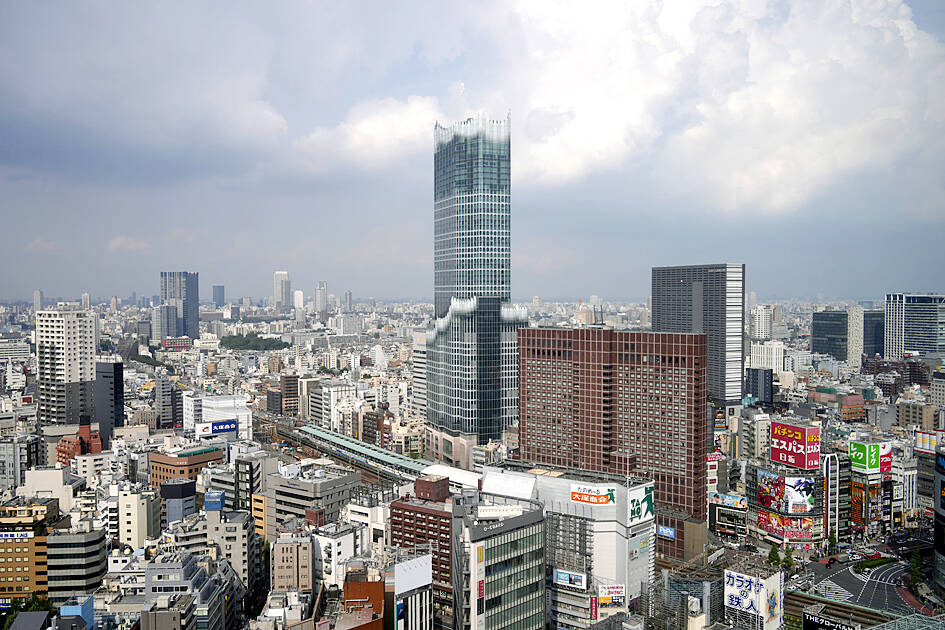Singapore became the biggest investor in Japan’s real-estate sector this year, charmed by the yen’s weakness and growing demand in the logistics and hospitality industries, Knight Frank LLP said.
Inflows from the city-state have totaled about US$3 billion so far this year, followed by investors from the US, Canada and the United Arab Emirates, a report published earlier this month said.
Singapore’s sovereign wealth fund GIC Pte’s purchase of six warehouses in Japan from Blackstone Inc for US$800 million contributed greatly to that, Knight Frank’s Asia-Pacific research head Christine Li (李敏雯) said.

Photo: EPA-EFE/FRANCK ROBICHON
GIC chief investment officer Jeffrey Jaensubhakij recently described Japan as a “very cheap” market where value can be realized, and with a long way to run. International investors are also attracted to its low borrowing costs, and investing more into hotels because of a post-COVID-19 tourism boom.
Foreign investors, including Goldman Sachs Group Inc, KKR & Co and Blackstone have spent a combined US$2 billion on hotel deals in Japan this year, more than any other sector in Asian commercial property, MSCI said.
Japan’s surge in hybrid work arrangements and rising supply has eroded investors’ appetite for office spaces, Knight Frank said.
Separately, the Japanese government would implement policies to boost part-time workers’ take-home pay to tackle labor shortages, the Yomiuri newspaper reported yesterday, without saying its source.
The government would also pay up to ¥500,000 (US$3,370) per employee to companies that have more than 100 employees with plans to raise wages or extend working hours.

When an apartment comes up for rent in Germany’s big cities, hundreds of prospective tenants often queue down the street to view it, but the acute shortage of affordable housing is getting scant attention ahead of today’s snap general election. “Housing is one of the main problems for people, but nobody talks about it, nobody takes it seriously,” said Andreas Ibel, president of Build Europe, an association representing housing developers. Migration and the sluggish economy top the list of voters’ concerns, but analysts say housing policy fails to break through as returns on investment take time to register, making the

‘SILVER LINING’: Although the news caused TSMC to fall on the local market, an analyst said that as tariffs are not set to go into effect until April, there is still time for negotiations US President Donald Trump on Tuesday said that he would likely impose tariffs on semiconductor, automobile and pharmaceutical imports of about 25 percent, with an announcement coming as soon as April 2 in a move that would represent a dramatic widening of the US leader’s trade war. “I probably will tell you that on April 2, but it’ll be in the neighborhood of 25 percent,” Trump told reporters at his Mar-a-Lago club when asked about his plan for auto tariffs. Asked about similar levies on pharmaceutical drugs and semiconductors, the president said that “it’ll be 25 percent and higher, and it’ll

CHIP BOOM: Revenue for the semiconductor industry is set to reach US$1 trillion by 2032, opening up opportunities for the chip pacakging and testing company, it said ASE Technology Holding Co (日月光投控), the world’s largest provider of outsourced semiconductor assembly and test (OSAT) services, yesterday launched a new advanced manufacturing facility in Penang, Malaysia, aiming to meet growing demand for emerging technologies such as generative artificial intelligence (AI) applications. The US$300 million facility is a critical step in expanding ASE’s global footprint, offering an alternative for customers from the US, Europe, Japan, South Korea and China to assemble and test chips outside of Taiwan amid efforts to diversify supply chains. The plant, the company’s fifth in Malaysia, is part of a strategic expansion plan that would more than triple

Taiwanese artificial intelligence (AI) server makers are expected to make major investments in Texas in May after US President Donald Trump’s first 100 days in office and amid his rising tariff threats, Taiwan Electrical and Electronic Manufacturers’ Association (TEEMA, 台灣電子電機公會) chairman Richard Lee (李詩欽) said yesterday. The association led a delegation of seven AI server manufacturers to Washington, as well as the US states of California, Texas and New Mexico, to discuss land and tax issues, as Taiwanese firms speed up their production plans in the US with many of them seeing Texas as their top option for investment, Lee said. The